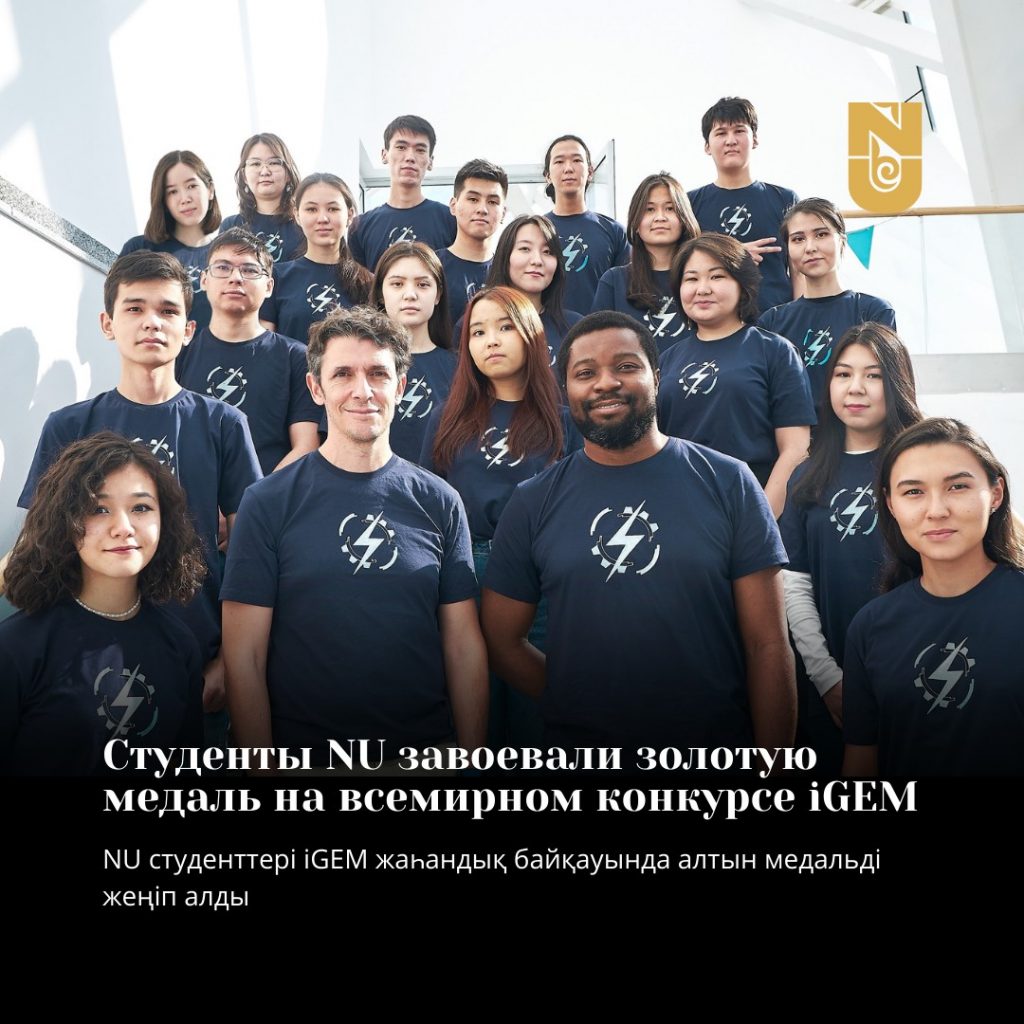NU team is a winner of the gold medal in the worldwide iGEM competition

iGEM Kazakhstan team that consists of NU students became a winner of the gold medal in the International Genetically Engineered Machine (iGEM) competition – an annual worldwide synthetic biology event for undergraduates, graduates, and high school students. iGEM competition is a truly international event with teams coming from all over the world. Every year nearly 6,000 people dedicate their summer to iGEM and then come together in Boston in the autumn to present their projects that strive to create a positive contribution to their communities and the world. The United States, Canada, Chile, Pakistan, Japan, South Korea, Egypt, Bulgaria, Mexico, Brazil, Germany, France, and Australia are only some of the countries that have participated this year.
iGEM Kazakhstan is the only team from Central Asia that has started participating in iGEM Competition since 2013 and has won 2 gold medals, 1 silver, and 2 bronze medals since then. This year, for the first time in the history of iGEM teams of NU, iGEM Kazakhstan team has been nominated for a multitude of awards, including Track Award – Best Environment Project, and three Special Awards – Best Wiki, Best Inclusivity, and Best Sustainability and made its way into the Top 10 Best Projects of the Year in the Undergraduate category among other 255 teams.
Members of the team are undergraduate students of NU SEDS and NU SSH. The project is supervised by Dr. Enrico Marsili, Associate Professor of NU SEDS, Dr. Obinna Ajunwa, Postdoctoral Research Fellow at the Department of Chemical and Materials Engineering, and supported by Daulet Aitymbayev, NU Alumna and current Master’s student at the Ludwig Maximilian University of Munich.
The team has been working on developing a safer way to treat oil spills that pollute the endemic flora & fauna of Kazakhstan. The project is dedicated to finding a solution to this problem by developing a novel agent for crude oil bioremediation – “Remi, du et!”. Currently, the team is finalizing the necessary experiment on a model strain – Pseudomonas aeruginosa and establishing grounds for further cooperative work with some Kazakhstani companies.
For NU_Kazakhstan, iGEM was a cycle with teams passing down their legacy each year to newer generation of iGEMers. However, due to COVID restrictions in 2020, there was no team, and we (me and Assylay) had to assemble a brand new team, find a new PI, and start a new project all from scratch in times of such uncertainty. There were many occasions throughout the year where we really thought that we couldn’t make it and will be forced to cancel the project. Gladly, everything worked out nicely in our favor, thanks to generous support from NU Faculty that supplied us with reagents.
All members worked on a project full-time from April, with up to 90 hours of work per week near the end of the competition. On the last day of submission we already lost hope of getting the right results from the lab because of the continued failure of our experiments. Luckily, right 6 hours prior to the Wiki Freeze wet lab members brought in results we were waiting for the entire year. All of the other members that haven’t gotten an ounce of sleep in the last few days were exhilarated regardless of their exhaustion. We called such feeling being ‘exhilirausted’ (laughs). It was truly a wonderful and learning experience for all of us. When the nominations were getting released, we actually started seeing fruits of our hard work, since now we knew that our sleepless nights did pay off. During the Giant Jamboree all team members and supervisors gathered to watch the Awards Ceremony, and we couldn’t hold back our pure happiness, when we saw “NU_Kazakhstan” in the list of all teams that gotten the Gold Medal, and were shocked to make it to the TOP-10 Best Projects of the Year, says the team lead Malika Vassilova.



